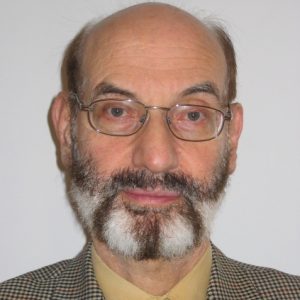Ramás Gergely
From 1961 he completed his university studies in the Soviet Union - from 1963 simultaneously at two universities. Between 1965-1967 he was a researcher at the Institute of Cybernetics of the Ukrainian Academy of Sciences.
He was a researcher at the Central Research Institute of Physics (KFKI) of the Hungarian Academy of Sciences between 1967 and 1975. - He defended his PhD thesis in 1970.
During his university years in Kiev, and then at the KFKI, he conducted research in the field of mathematical theory of highly complex systems. He applied his results on the synthesis of special stochastic processes to the description of computer systems, for which he received the Academic Youth Prize in 1973. He developed a psycho-cybernetics model of the learning process, which was used for a long time, e.g. in computer educational systems. He also conducted research in systems theory.
From 1975 to 1992 he was employed at INFELOR Systems Technology Company and its successors (Számki, Számalk). - In 1988 he obtained the title of Doctor of the Hungarian Academy of Sciences.
His research interests turned towards mathematical logic and computer science. He worked on developing a unified computer science based on mathematical foundations, developing a constructive programming theory with efficient specification tools and methodology. He provided a tool for the unified logical foundation of programming logics; in the field of software engineering, he developed a unified constructive logical framework for the exact definition and verification of the meaning of programs. For these achievements (already as a colleague of the Computer Applications Company, Számalk), he received the shared Kalmár Prize in 1979.
In 1986, he co-founded the ALL Computer Science Research and Development Cooperative (legal successor: Applied Logic Laboratory Research and Development Cooperative), which he led until 2018. At that time, he worked on logic-based reasoning theory, machine learning, information and knowledge extraction, and intelligent data analysis; the main target areas of applications are biomedical and clinical medical informatics. The so-called intelligent partner systems developed with his colleagues made it possible to create expert systems in many medical fields (nephrology, immunology, cardiology, pulmonology, etc.). - He received four patents related to individualized diagnosis and optimal personalized therapy selection.
Since the 1980s, he has been the professional leader and participant of numerous domestic and international R&D projects. Among them was the Hungarian-Soviet Logical-Information Computing Systems project initiated and led by him (at the same time as the Japanese 5th generation computing project - providing a constructive response to several challenges raised by the Japanese). Some other achievements: educational theory and methodology based on cognitive psychology (the results were applied by several educational institutions), and the development of the programming theory referred to as the “Hungarian school”.
His main research areas are computer science, artificial intelligence, cognitive systems, intelligent data analysis, complex systems modeling, and bioinformatics. He has published more than 200 research publications and 15 books.
From 1978 to 1990 he was an external associate of the Hungarian Academy of Sciences' Mathematical Research Institute. In 1993 he became an honorary professor at the Budapest University of Technology (BME), and in 1994 he was elected an external member of the Russian Academy of Natural Sciences. From its establishment until 2002 he was the chairman of the Scientific Council of the Bay Zoltán Applied Research Foundation. - Former chairman of the Artificial Intelligence Department of the Hungarian Academy of Sciences.
His awards: Academic Youth Award (MTA, 1973); Kalmár Award (shared, NJSZT, 1979); Professional Medal for Hungarian Informatics (Minister of Informatics and Communications, around 2003).
Created: 2020.10.05. 14:02
Last modified: 2021.12.29. 19:21

